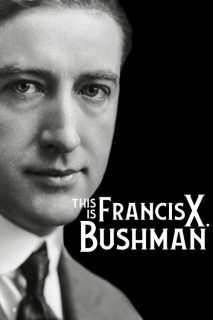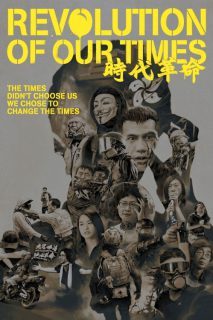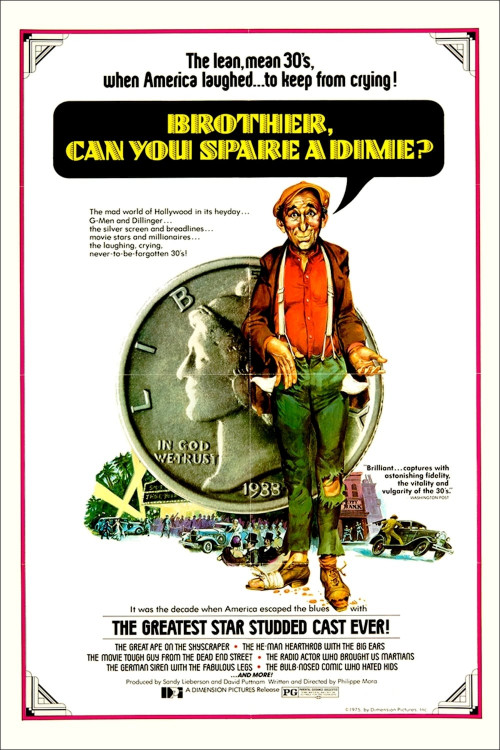
- Year: 1975
- Released: 11 Sep 1975
- Country: United Kingdom, United States
- Adwords: 1 nomination
- IMDb: https://www.imdb.com/title/tt0072742/
- Rotten Tomatoes: https://www.rottentomatoes.com/m/brother_can_you_spare_a_dime
- Available in: 720p, 1080p,
- Language: English
- MPA Rating: PG
- Genre: Documentary
- Runtime: 103 min
- Writer: Philippe Mora
- Director: Philippe Mora
- Cast: Laverne Andrews, Maxene Andrews, Patty Andrews
- Keywords: great depression,
 | 7.0/10 |
 | 57% – Audience |
Brother Can You Spare a Dime Storyline
A nostalgic look back at the Great Depression with contemporary archival footage and film clips picturing James Cagney as an American Everyman.
Brother Can You Spare a Dime Play trailer
Brother Can You Spare a Dime Photos
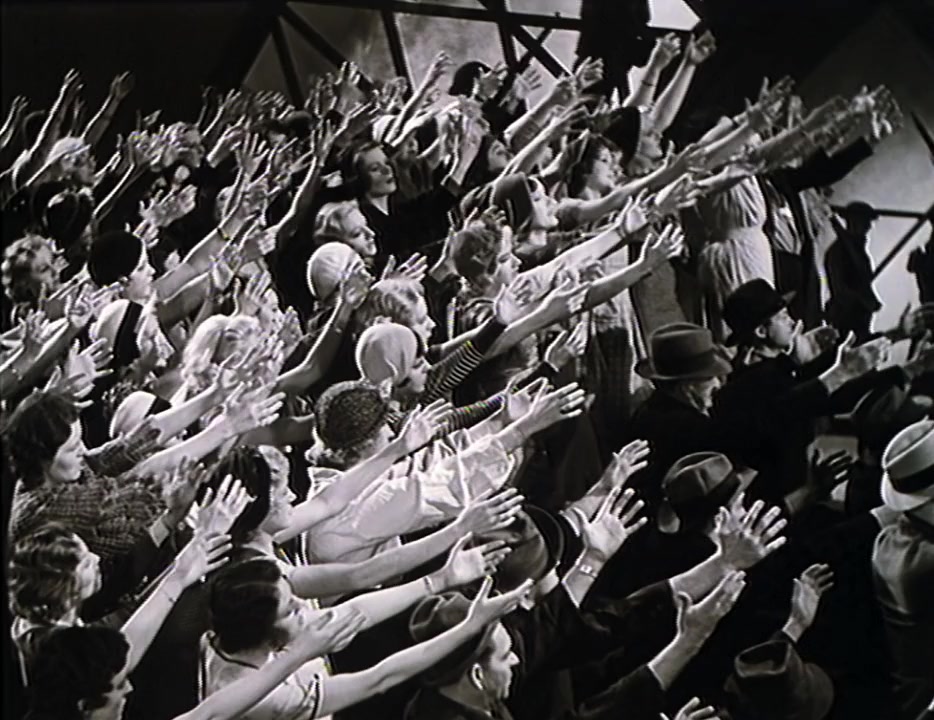
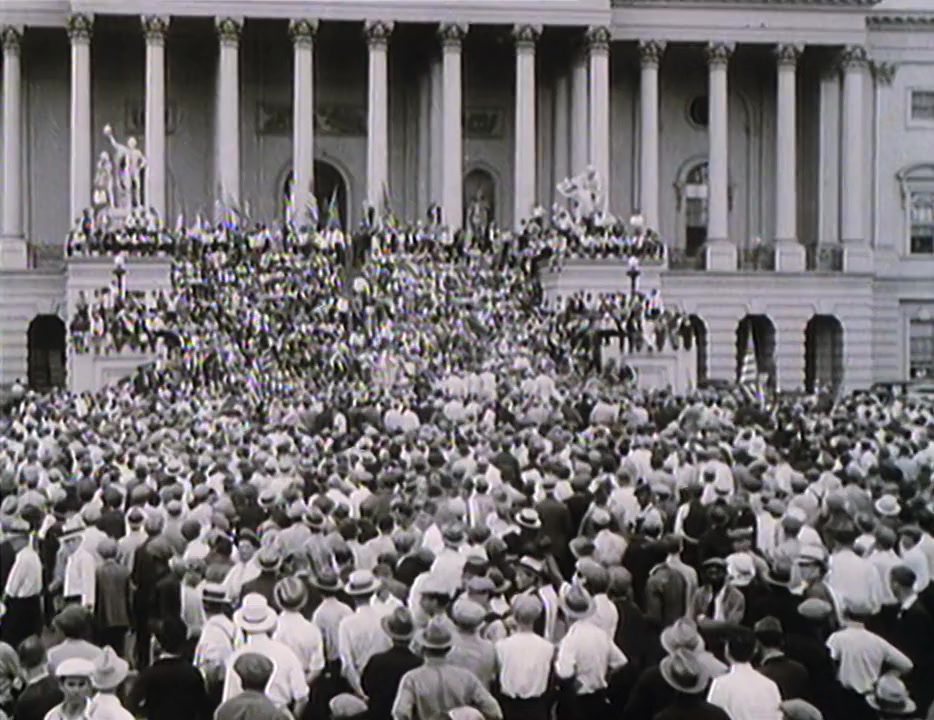

Brother Can You Spare a Dime Torrents Download
| 720p | bluray | 1022.82 MB | magnet:?xt=urn:btih:D4B3298F8CB67A7823BEE66AB5C9315D0CCC0086 | |
| 1080p | bluray | 1.85 GB | magnet:?xt=urn:btih:50E37C1719B83089340CAD8D9331939531315FC6 |
Brother Can You Spare a Dime Subtitles Download
Brother Can You Spare a Dime Movie Reviews
An amazing embodiment of American in the 1930s
I saw this feature doco during its original run in 1977, I think, and for the second time recently in a retrospective of Philippe Mora’s work 25 years later. It is an amazing piece of work, with the material itself providing the narrative … actual speeches, songs and sound on the film … there is no narration or voice over. The years from Depression up to WW2 come to life with this artful assembly of scenes from musicals, songs, newsreels and speeches. Considering it was produced by an Englishman and directed by an Australian, it has a remarkable sensitivity for its subject. Highly recommended for lovers of documentary or history.
Entertaining and Educational, Sort Of.
Well, I enjoyed it, but I’m not certain about my college classes. I wanted them to get a feel for life during the Great Depression and the way the economic collapse was treated by Hollywood — half realism, half escapism.
I showed it as a kind of vacation from classroom drudgery, no assignments associated with it, and maybe that was a mistake because they seemed bored by it.
Possibly the footage and the messages behind it were so dated that it lacked any relevance for them. In another class, on memory, I tried illustrating the kind of mastery of detail that leads to the ability to reproduce the thing remembered. (Eg., you’d have to know Vincent in the Flames very well in order to reproduce it stroke for stroke.) The example I used was Jimmy Cagney. I’d stand up there shrugging, hitching up my pants, sneering, and carrying on about, “You dirty rat. You give it to me and now I’m gonna give it to you.” (I was pretty good.)
Not a peep. After suffering the humiliation of a non-response through three semesters I finally asked what was wrong with my impression of Jimmy Cagney. A long pause, then the response: “Who’s Jimmy Cagney?” I’m sure most of them didn’t catch the other historical figures either, whether icons or small potatoes.
“Who’s that gorilla on top of the Empire State Building?” Or — worse! “What’s that big building the gorilla is standing on?”
All of this raises some interesting questions. Whatever happened to our shared cultural data base, of which this movie is in part a quick sketch? What does it take to capture the imagination of a nescient people whose interests do not extend beyond their own body sheaths?
Of course none of this is any reflection on these carefully assembled bits of newsreel footage and clips from Hollywood movies, too numerous to begin to describe. It follows a certain arc, which, with attention, can be discerned through the blizzard of images. I’ll give a few examples.
The political thread begins with Herbert Hoover and towards the end gives us glimpses of John F. Kennedy and his family. The many dancing scenes start with a marathon from the early 30s, with one shuffling dancer dragging his sleeping partner along the floor, and they end with the wildly ecstatic gyrations of the jitterbug. The songs themselves grow more chipper, the speeches more uplifting and hopeful. Then, in the very last scene, with World War II won and Americans bathed in peace and prosperity, a hydrogen bomb explodes and we hear the voice of W. C. Fields: “I wonder. I wonder. . . .”
It’s all impressionistic, a collage of incidents real and fictional, but skillfully done.
HISTORY REPEATING ITSELF
In 1975 Australian director Phillipe Mora used a combination of film news reels and feature films to compose a look at America during the great depression. The result is BROTHER CAN YOU SPARE A DIME, a song used throughout the film performed by various people, that shows us a glimpse of history as seen through the eyes of the camera lens.
The film depicts our country at its worst and best at the same time as hungry people seek work and look for any bit of help they can find. At the same time Hollywood depicts the world as bright and gay in an attempt to alleviate problems if only for 60-90 minutes for those who can afford a ticket.
But Mora doesn’t just use the film clips to show Hollywood’s depiction of the good old/bad old days, instead using clips to move his story forward from year to year. The main character we watch doing so is actor James Cagney whose screen persona’s featured him as a tough gangster and as an actor who worked throughout the years of the Depression in various roles. He is the common thread through the film as we watch the times change. The film walks us through the worst period in our history and ends with a tragic event that helped us out of the depression but led us into something worse, the Second World War.
What is fascinating to watch in this film is the resilience of the American people whose spirit got them through those times and watched them come out with a successful country after. It’s also interesting to see some moments in history displayed on film that you would almost assume were shot yesterday were it not for the clothing and black and white footage. In particular is a man standing on a soapbox heralding the wonders of socialism preaching how great it is and how it protects and saves the masses. Many of the things he touts sound like this could be a young Bernie Sanders on that soapbox even though it isn’t.
The film is interesting in the historical aspects it shows but might not be for everyone. There is no linear plot to follow here, no all-around story being told. Instead it provides a look at our history that many have either forgotten or never heard of. For that reason alone it’s a valuable film that many young people should be required to watch. A generation with Fitbits, cell phones and rides to any place they desire while talking about how rough their lives are would be well served to see how bad things could actually be.
VCI has done a nice job with this film releasing it for the first time on blu-ray. Their released may not garner the attention that companies like Shout Factory and Arrow Video are but they should be praised for their attempts to save films that would otherwise be lost. This is one of those films worth not just saving but seeing.

